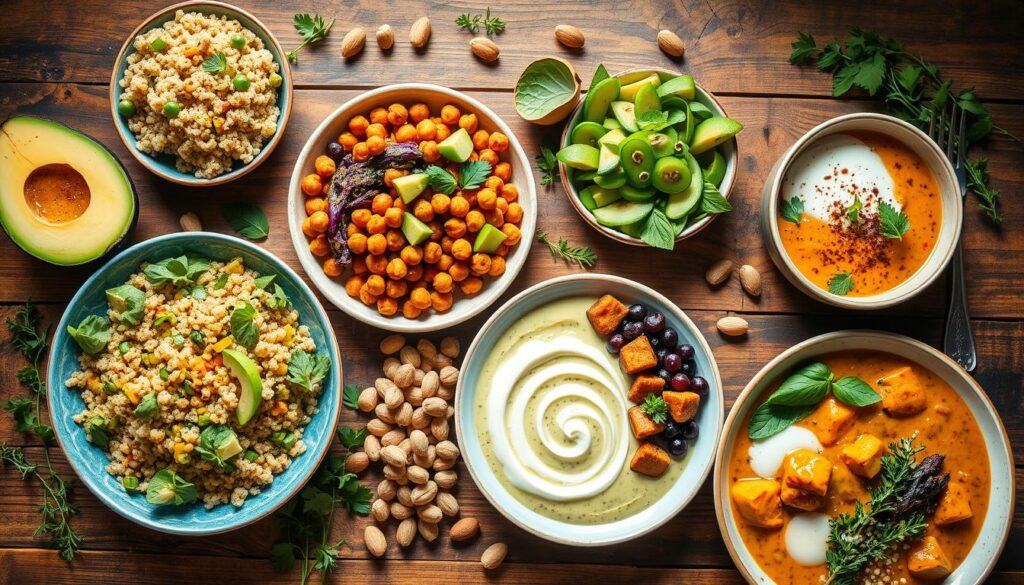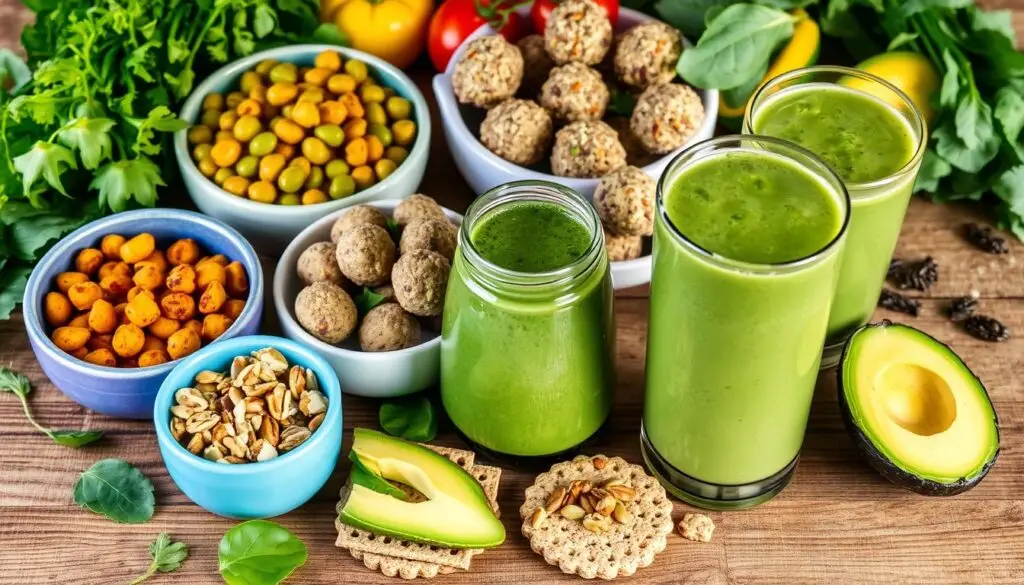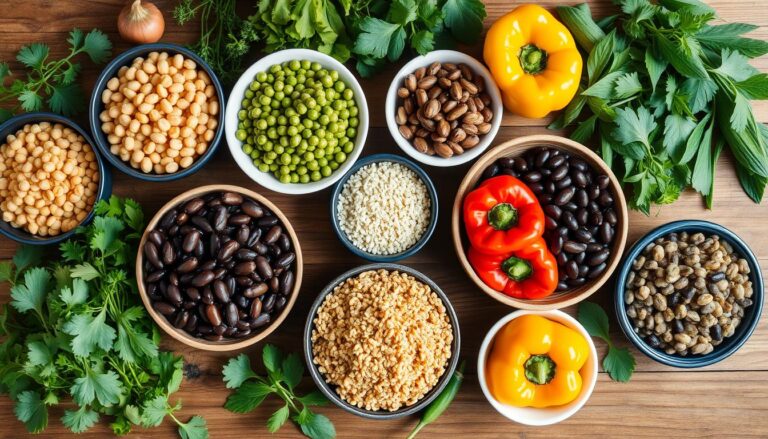Table of Contents
As a vegan, I’ve faced doubts about building muscle on a plant-based diet. But I’m here to say it’s not only possible, but it’s also delicious and rewarding. We’ll look at high-protein vegan foods and share tasty recipes that support your fitness goals.
Whether you’re a vegan athlete or new to plant-based nutrition, you’ll find many Plant-Based Protein Sources for muscle building. We’ll explore foods like lentils and tempeh, which are nutritional powerhouses for your fitness journey.
Ready to try High-Protein Vegan Recipes and start a Meatless Bodybuilding Diet? Let’s create nutrient-dense dinners that boost your strength and energy.
Understanding Vegan Muscle Building Nutrition
Building muscle on a vegan diet needs a smart nutrition plan. You must eat enough calories and macronutrients to grow muscles. Eating more calories than you burn is key to building new muscle.
Essential Macronutrients for Muscle Growth
Protein is the base for muscle building. Vegans should aim for 1.6-2.2g of protein per kilogram of body weight daily. Legumes, nuts, seeds, and soy products are great sources of protein.
Carbohydrates and fats are also vital. They give you energy and help with health. A mix of these nutrients is key for building and recovering muscles.
Key Vitamins and Minerals to Include
Some vitamins and minerals are crucial for vegan muscle builders. Vitamin B12 is important for energy and muscle function. Nutritional yeast is a good vegan source, offering 2.4mcg per 2 tablespoons.
Creatine supplementation can also help vegan athletes. It’s because there are few dietary sources and B12 deficiency can affect creatine production.
Knowing the right macronutrients and nutrients helps vegans build a diet for fitness goals.
Delicious Protein Sources for Vegans
Building muscle on a vegan diet means focusing on protein. Luckily, there are tasty, plant-based options to help with Vegan Bulking Nutrition and Plant-Based Muscle Fuel.
Legumes: Beans, Lentils, and Peas
Legumes are full of protein, fiber, and nutrients. Beans have about 15 grams of protein per cup. Lentils offer 18 grams, and edamame has 17 grams per cup. Adding these to your meals boosts your protein.
Tofu and Tempeh: Versatile Protein Powerhouses
Soy-based products like tofu and tempeh are great for Vegan Bulking Nutrition. Tofu has 20 grams of protein per cup. Tempeh has an amazing 34 grams per cup. They’re versatile and can be used in many dishes to support your Plant-Based Muscle Fuel.
Seitan: The Meat Alternative
Seitan is a favorite for vegans because of its meat-like texture and flavor. Made from wheat gluten, it has 34 grams of protein per 1/2 cup. It’s a great meat substitute, helping you stick to a balanced Vegan Bulking Nutrition plan.
Adding a variety of these Vegan Bulking Nutrition sources to your diet can help reach your Plant-Based Muscle Fuel goals. By choosing nutrient-rich, high-protein plant-based foods, you can fuel your body and support your fitness journey.
Whole Grains for Sustained Energy
Whole grains are key for Vegan Muscle Building Meals and Cruelty-Free Fitness Meals. They give you long-lasting energy for tough workouts. They also help you reach your fitness goals.
Quinoa: A Complete Protein
Quinoa is a special ancient grain that has all the amino acids you need. A quarter cup of uncooked quinoa has 170 calories, 27 grams of carbs, 3 grams of fiber, and 6 grams of protein. You can add it to many dishes like salads, stir-fries, pilafs, and breakfast bowls.
Brown Rice vs. White Rice
Brown rice is better than white rice because it’s more nutritious. A half-cup of cooked brown rice has 109 calories, 23 grams of carbs, 2 grams of fiber, and 2 grams of protein. White rice, on the other hand, has less nutrients because it’s missing its outer layers. Adding brown rice to your meals gives you more energy and better nutrition.
Oats: A Breakfast Champion
Oats are a great whole grain for breakfast. A quarter cup of uncooked oats has 35 grams of carbs, 2 grams of fiber, and 4 grams of protein. They also have good polyphenols. You can enjoy oats in many ways, like overnight oats, oatmeal, baked goods, and energy bars.
Adding different whole grains to your meals helps with energy, recovery, and muscle building. It’s important for your fitness journey.
Incorporating Healthy Fats
Healthy fats are as important as protein for building muscle on a vegan diet. They help with hormone production, nutrient absorption, and overall health. Let’s look at the best vegan sources of healthy fats for your Ethical Strength Training and Vegan Bulking Nutrition plan.
Avocados: Creamy and Nutrient-Rich
Avocados are full of monounsaturated fats, which are good for your heart and reduce inflammation. They also have vitamins, minerals, and antioxidants that help with muscle growth and recovery. Try to eat avocado a few times a week, in salads, on toast, or in smoothies.
Nuts and Seeds: Small But Mighty
Nuts and seeds are packed with healthy fats, protein, and other nutrients. For example, a quarter-cup of almonds has 7.5 grams of protein and many vitamins and minerals. Other good options include walnuts, cashews, pumpkin seeds, chia seeds, and flaxseeds. Add these to your meals, snacks, and smoothies for a boost of Ethical Strength Training and Vegan Bulking Nutrition.
Oils for Cooking: Olive vs. Coconut
Olive oil and coconut oil are great for cooking on a vegan diet. Olive oil is full of monounsaturated fats and has anti-inflammatory properties. Coconut oil has medium-chain triglycerides (MCTs) that may help with weight management and physical performance. Try both oils to see which works best for your Ethical Strength Training and Vegan Bulking Nutrition.
| Healthy Fat Source | Nutritional Benefits |
|---|---|
| Avocados | High in monounsaturated fats, vitamins, and antioxidants |
| Nuts and Seeds | Provide healthy fats, protein, and a variety of essential nutrients |
| Olive Oil | Rich in monounsaturated fats with anti-inflammatory properties |
| Coconut Oil | Contains medium-chain triglycerides that may support weight management and physical performance |

Meal Prep Strategies for Success
Keeping up with High-Protein Vegan Recipes for Vegan Muscle Building Meals needs good planning and prep. Meal prep can change the game, saving time and helping you hit your nutrition goals. These tips will help you succeed in building muscle.
Planning Your Weekly Menu
Begin by planning your meals for the week. Mix in various High-Protein Vegan Recipes with different protein sources like legumes, tofu, tempeh, and seitan. This makes meals fun and ensures you get all the amino acids you need.
Batch Cooking for Convenience
Set aside a day or two for batch cooking. Make big batches of grains, legumes, and roasted veggies. This way, you can quickly make Vegan Muscle Building Meals all week, saving time and effort.
Storing and Reheating Meals
Get good airtight containers for storing meals. They keep food fresh and nutrients in. Reheat meals in the oven or microwave. Freezing meals is also a great option for later use.
Using these Meal Prep Strategies for Success will help you fuel your body right for Vegan Muscle Building Meals. You’ll save time and feel good knowing your meals are ready to go.
Delectable Vegan Dinner Ideas
Choosing plant-based protein sources for your meals is tasty and healthy. It helps support your meatless bodybuilding diet. Here are three vegan dinner ideas that are full of flavor and nutrients to help you reach your fitness goals.
Chickpea Stir-Fry with Quinoa
This chickpea stir-fry is a mix of chickpeas and quinoa. It’s a meal that builds muscle. Cook chickpeas, veggies, and quinoa in a tasty soy sauce. It’s a quick dinner with 35 grams of protein per serving.
Vegan Chili Loaded with Protein
A big vegan chili with beans, lentils, and textured vegetable protein is protein-rich. It has 24-32 grams of protein per 3-4 servings. This chili will keep you full and happy.
Stuffed Peppers with Lentil and Rice
Roasted bell peppers filled with lentils, rice, and spices are a balanced dinner. It has 21 grams of protein per serving. It’s a great choice for your plant-based protein sources and meatless bodybuilding diet.
These vegan dinner ideas can be tailored to fit your protein and calorie needs. They let you enjoy tasty, plant-based protein sources while following your meatless bodybuilding diet goals.
Utilizing Superfoods in Your Meals
As a vegan athlete, it’s key to eat foods that help your muscles grow and recover. The plant-based world has many superfoods that can make your meals better and help you reach your fitness goals. Let’s look at two vegan superfoods you should add to your diet.
Spirulina: A Nutritional Powerhouse
Spirulina is a protein-rich blue-green algae that’s great for vegans and athletes. It’s full of vitamins, minerals, and antioxidants that help with muscle recovery, energy, and health. Its high protein and complete amino acids make it perfect for Vegan Muscle Growth.
You can add spirulina to smoothies, salads, or baked goods. Its earthy, sweet taste goes well with many foods. This makes it a great addition to your Nutrient-Dense Vegan Foods.
Chia Seeds: Tiny Seeds, Big Benefits
Chia seeds are another Nutrient-Dense Vegan Foods you should have. These small seeds are full of omega-3s, protein, fiber, and vitamins and minerals. They help with muscle recovery, reduce inflammation, and give you energy for Vegan Muscle Growth.
Put chia seeds on oatmeal, in yogurt parfaits, or make puddings and energy bars with them. Their versatility and nutrition make them essential for vegan athletes.
Adding these Nutrient-Dense Vegan Foods to your meals can boost nutrition and support Vegan Muscle Growth. Try different ways to enjoy spirulina and chia seeds. Discover how these superfoods can change your meals.
Snack Ideas That Support Muscle Growth
As a vegan looking to build muscle, having the right snacks is key. Snacks high in nutrients and protein give you the energy and fuel your muscles need. Let’s look at some tasty, easy-to-make vegan snacks that help with Vegan Bulking Nutrition and Plant-Based Muscle Fuel.
Energy Bars Packed with Protein
Homemade energy bars with oats, nut butter, and vegan protein powder are great for energy. They have 15-25 grams of protein, balancing carbs, fats, and protein for muscle fuel. Make your own with oats, almond butter, and pea or brown rice protein powder.
Hummus and Veggies: The Perfect Pair
Creamy hummus with fresh veggies like carrots, celery, and bell peppers is a tasty, healthy snack. Hummus has 2-7 grams of protein per serving, while veggies add fiber, vitamins, and minerals. This combo supports your health and fitness goals.
Other vegan snacks for muscle growth include:
- Steamed edamame, offering 17 grams of protein per cup
- Roasted chickpeas, providing 15 grams of protein per two-thirds cup serving
- Fruit with nut butter, combining carbs, healthy fats, and up to 7 grams of protein per 1-ounce serving of nuts
Adding these protein-rich, nutrient-dense vegan snacks to your diet fuels your muscles. It keeps your Vegan Bulking Nutrition and Plant-Based Muscle Fuel on track.

Hydration’s Role in Muscle Building
Drinking enough water is key to building and keeping muscle. Water helps muscles work well and recover. Sadly, about 75% of Americans are dehydrated every day, which hurts muscle repair and growth.
Water: The Essential Nutrient
Even losing just 2% of body fluid can lower endurance and energy. For someone who weighs 150 pounds, that’s like losing 3 pounds. Dehydration makes it hard for muscles to get the nutrients they need. This affects how well you can exercise, your strength, and your focus.
To stay hydrated, experts say to drink at least 16 to 20 ounces of fluid before working out. Drink 5 to 10 ounces every 20 minutes while you’re active. After working out, drink at least 16 ounces for every pound you lost. Keeping your body hydrated is crucial for muscle growth. Water helps move nutrients like amino acids and glucose to muscles for repair and growth.
Smoothies for Post-Workout Recovery
Vegan smoothies are also great for muscle recovery after working out. These drinks are full of plant-based proteins, fruits, and leafy greens. They help replace and fix muscle tissue.
A smoothie with vegan protein powder, banana, and spinach is packed with amino acids, carbs, and antioxidants. It’s a powerful way to support your Cruelty-Free Fitness Meals and Ethical Strength Training goals.
“Water is essential for maintaining electrolyte balance, necessary for proper muscle contractions during exercise.”
Overcoming Common Vegan Diet Challenges
Starting your vegan muscle building journey might face some challenges. But, with the right strategies, you can overcome these and reach your fitness goals. Let’s look at two main areas: getting enough protein and balancing your macronutrients.
Meeting Protein Requirements
Getting enough protein as a vegan is easy with plant-based sources. Legumes, like beans, lentils, and peas, are great high-protein options. Tofu, tempeh, and seitan are also strong vegan protein powerhouses for many high-protein vegan recipes.
Whole grains, such as quinoa and oats, add plant-based protein to your diet. Mixing these sources helps you meet your daily protein needs and supports your vegan muscle building meals.
Balancing Macronutrients
A balanced vegan diet needs the right mix of carbs and healthy fats. Whole grains, fruits, and vegetables give you sustained energy for workouts and recovery. Healthy fats from avocados, nuts, seeds, and oils are key for hormone balance and health.
Talking to a registered dietitian who knows vegan nutrition is very helpful. They can help you balance your vegan muscle building meals for the best results.
“A mix of preparation, adaptability, and communication with restaurant staff are key to overcoming eating out challenges as a vegan.” – Renowned chef Jamie Oliver
By tackling these common vegan diet challenges, you’ll be on your way to fueling muscle growth and fitness. Enjoy delicious, nutrient-rich vegan muscle building meals and high-protein vegan recipes.
Conclusion: Embrace Vegan Muscle Building
Building muscle on a vegan diet is definitely possible with the right plan and focus on nutrient-rich foods. You have many options like plant-based protein sources like legumes, tofu, and quinoa. Whole grains and healthy fats also play a big role in your vegan muscle growth and fitness goals.
Recap of Nutrient-Dense Meal Options
This article showed you how important it is to balance macronutrients and get all the vitamins and minerals you need. Try out different high-protein vegan dishes like chickpea stir-fries and lentil-based chilis. Also, don’t hesitate to try new recipes and make your meals tasty and healthy.
Encouragement to Explore New Recipes
Keep exploring new vegan dishes as you work on building muscle. Look for inspiring recipes and connect with others who share your interests. With hard work, dedication, and a focus on healthy foods, you can reach your fitness goals and enjoy the benefits of a vegan lifestyle.
